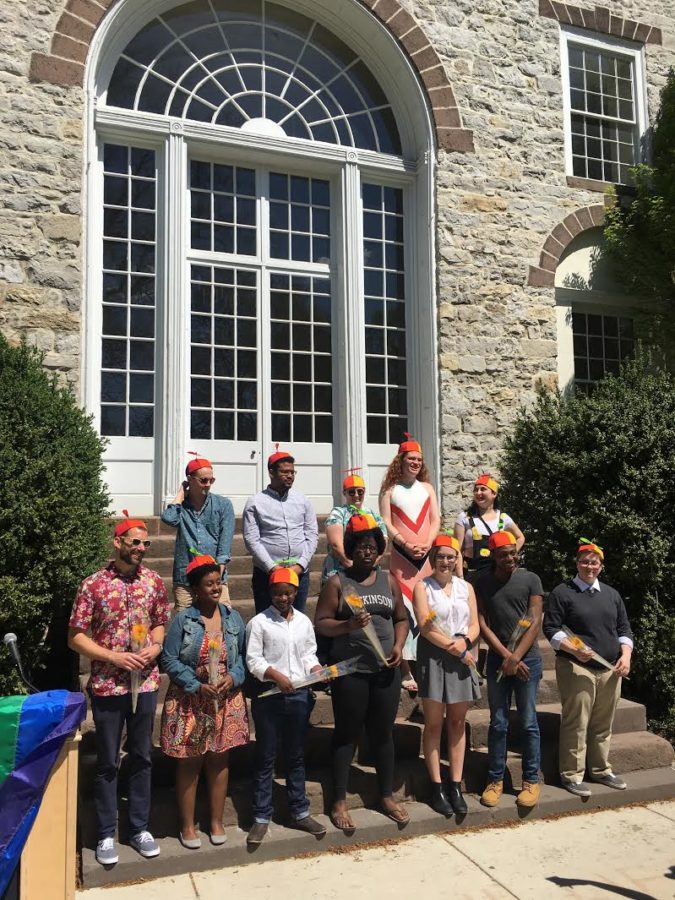Class of 2018 Queer Caps Tapped
Stephanie Czmar ’19 / The Dickinsonian
The ceremony took place on the steps of Old West.
Morgan Bates ’18, Drey Battle ’18, Alicia Bazell ’18, Courtney Gamache ’18, Sofina Odero ’18, Ari Watson ’18, and Mergitu Yadeto ’18 were made members of the Queer Caps on Tuesday, April 18 on the steps of Old West.
The Queer Caps were founded in 2008 to “encourage visibility of queer activists on campus” according to the Dickinson College website.
According the Erica Lawrence, director of the Office of LGBTQ+ Services and college dean, “the Class of 2017 Queer Caps felt as though these students have advocated for queer rights and have worked to tear down traditions and establishments that perpetuate systems of oppression.”
Kitson Smyth ’17, member of the Class of 2017 Queer Caps, explained during their speech during the ceremony that the new members embodied the aspects of the rainbow flag. Each one brings life, healing and spirit to the campus and its students according to Smyth.
The Class of 2018 Queer Caps were given rainbow propeller hats and sunflowers, or happy flowers, during the ceremony.
The society also taps one faculty to be an honorary member during their annual ceremony. This year they selected Professor Jeff Engelhardt, Assistant Professor of Philosophy.
Professor Engelhardt said he was “honored” and that he “think[s] it’s important for queer members of the Dickinson community to be visible and vocal around campus.” He is also “especially happy that the cohort of which [he is] a member is quite diverse.”
Bazell, who is currently studying abroad in Copenhagen, participated in the rally and march to the Carlisle town hall in support of the anti-discrimination ordinance, also shared Professor Engelhardt’s feelings of being honored to be tapped. Bazell said that she is “so excited to be a Queer Cap alongside such amazing people on this campus!”
Gamache, who had a part in the creation of RAISE, the LGBTQ+ Service’s main educational outreach program, said she felt humbled by being tapped.
Odero said that being tapped meant they are “being seen as an individual who has always[s] queered the spaces they’ve entered since being enrolled here at Dickinson College. It means that [their] efforts to make this campus a little more inclusive, intersectional and queer have been acknowledged and appreciated.”
Odero also said that their “proudest moment of activism for queer rights was during the early stages of creating a group oriented towards queer students of color called Queer People of Color+ (QPOC+). While the group did not end up being Senate recognized, [they] appreciated being able to explore a community of unseen queer students/people that aren’t typically thought of as a part of the dominant narrative of queer life on Dickinson’s campus (and in general, the nation.) Queerness has only been recognized in white spaces and through working on making a group to disrupt that narrative, [they were] able to make life-long connections with other queer students of color and grow as a black queer womxn.”
Yadeto said that “being tapped by the Queer Caps motivates [her] to continue to be unapologetic in my activism.”
Yadeto participated in a protest held by Spectrum and the Feminist Collective for gender-neutral bathrooms on campus during her freshman year. “To see how that protest started a dialogue that ultimately led to gender-neutral bathrooms on campus is incredible,” commented Yadeto.
Smyth said that they were “honored to be tapped last year in a tradition honoring LGBTQ+ activists on campus,” and that they “hope these new members form a stronger bond from being a member of the Queer Caps.”



